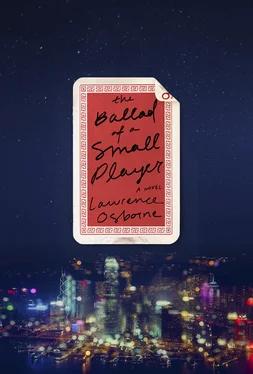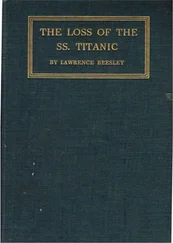When I got back to the Lisboa the receptionists didn’t even look up as I walked in, and I went up to my room unremarked upon. I stayed there for less than five minutes, collecting a few items, such as a wristwatch and a light raincoat, leaving my passport in the desk drawer where it had lain undisturbed for months. I closed the curtains and left the bathroom light on but extinguished the others. I stood for a moment in the center of the room and looked around this ridiculous habitat that I had made my own for so long, wondering if it were even possible now to simply walk out as if it were a stage prop that could be discarded. I turned and decided not to think about it. In my raincoat and suede shoes I went back down to the lobby, hoping I could pass out of the building as anonymously as I had just entered it. And indeed no one noticed me.
I walked to the terminal. A sullen crowd had already gathered for the first boat over and the men were smoking. The skies had grown overcast, and for a while it looked as if there might be a last-minute decision about whether to let the hydrofoil out into open sea. On the horizon the monsoons hovered. At six thirty we began to board, and I sat at the front of the craft among the old people wrapped up to the eyeballs as if it were the dead of a European winter, and off we set, the all-night low rollers and a few of the cleaning staff and some confused tourists and Lord Doyle, rocking on ominous swells and swinging into view of the green mountains of the South China Sea, which are always as soft and definite as monuments carved out of jade.
I sat against the window and thought back over the sequences of my losses, struck by a sort of disbelief in them because they went, I thought, against the statistical law of odds. I had been duped, but there was no going back.
Buddhists believe that the afterlife is divided into six realms. There is the realm of devas , or blissful gods; the realm of animals and that of humans; the domain of the asura demi-gods; and of preta , or hungry ghosts. Below them all lies the realm of naraka , or Hell.
Each realm reflects the actions of a previous life. People who are reborn as hungry ghosts were strongly acquisitive, driven by desire. Their insatiable needs are symbolized by their long necks and swollen bellies. Continually suffering from hunger and thirst, they cannot sate or slake either craving. They are supernatural beings and so their sufferings far exceed our own. Their hunger is a thousand times more intense than ours, and so is their thirst.
For the Chinese the realm of the hungry ghosts is similar to Hell in the Christian world. Its inhabitants have mouths the size of needle eyes, and stomachs as large as caves. Taoists believe that the hungry ghosts did not find in life what they needed to survive. They are the ghosts of suicides and those who have suffered a violent death.
And they are awaiting reincarnation, like everyone else. “The Sutra on the Ghosts Questioning Mu-lien” describes a deceitful diviner being reborn as a hungry ghost for several lifetimes. During the seventh lunar month of the Chinese calendar, the hungry ghosts are let out of Hell and roam freely seeking food and entertainment, and the Hungry Ghost Festival welcomes them. The sacrificial altars house the bodhisattva Ksitigarbha, offering plates of rice flour cakes and peaches, and they say that it is what the hungry ghosts want to eat, as if mortals would know, when in reality they know nothing about the ghosts at all.
I was thinking of all this as I got up and walked to the front door of the hydrofoil and peered out into the rain as the boat listed slightly in the wind and the guards in their waterproof capes strained to catch the first sight of the skyscrapers. The looming crystals of capitalism that fill us with comfort and dread. I edged out onto the rails and slipped back to the rear of the craft, where there was a platform of some kind, and I hung on with wet hands scanning the diminishing mountains of the mainland, on which could be seen groups of white houses and snaking roads and little fields of sunflowers. This land that I always passed and never explored. A distant paradise called “China” that was reputed to be Hell on earth but was probably something in between. If I threw myself into the sea right then, it was possible that my human instinct to survive would impel me to swim there and wash up on a beach, ready to be collected by the Red Army. Or perhaps I would have the inner force to keep myself under water.
As I stood there I must have wavered too long. The moment came and went, and as I was going black and vibrant inside, as I prepared to step off the platform and greet a long, rolling gunmetal wave that seemed to be following the hydrofoil, there was a blast of a foghorn and I was shaken back into normal consciousness. I turned my head and suddenly saw the steel and glass towers penetrating a mantle of stationary mist, a Wagnerian spectacle of pure horror that overwhelmed any petty thoughts of my own. It so surprised me that I stepped back from the precipice and caught my breath.
It was enough to spoil the opportunity, and then we were passing Sulphur Sound and it was too late; we were too close to the machinery of life.
The terminal was its usual self, a pandemonium of wild-eyed commuters, food, and tea. I walked out directly into the traffic in the rain and strode across Con-naught Road. I had no umbrella and soon I was soaked, struggling between the tower blocks of Wing Lok, the Hing Yip Center and the Tung Hip and the Mandarin Building on Bonham Strand. They all seemed familiar and completely unknown at the same time, like things one has left behind in an abandoned room, having turned off the lights and closed the door weeks ago. And then one returns and everything is as it was. I walked miserably toward the Pemberton and the Kai Fung mansion, a fly stuck in a jam jar, and my mind did not — as was customary — race ahead of my body, but instead trailed far behind it. The familiar British names that always consoled: Wellington, Queen’s Road, Gough, Aberdeen, Cleverly. And so down in a quick bus ride to Wellington to Aberdeen and halfway down it the Sam La Lane playground, where a few unhappy brats were at it with their moist nannies, and farther on the street named, I assume, after Lord Elgin, thief of marbles. Elgin goes on and on and there is an Elgin Building and a building called the Elgin and the massive and brutal Sacred Heart Canossian at the end of it, where I used to buy an ice cream on hot nights and eat alone just because of the name. But the center of Elgin is the escalators that rise through the tenements and the tourist restaurants, none of them Chinese, making their way up the mountains toward railed platforms and the silent residential roads of the heights. The late-nighters gripping the moving handrails as they stare down into the alleys passing by. The feeling of fetes suspended and abandoned as people go home. I have always thought it is the best way to move through a city, on a moving beltway at the pace of a walker, everyone at the same speed and therefore never bumping into one another. I dropped into Taku and sat at the sushi bar dithering, and then decided I couldn’t risk my last pennies on a shrimp roll. I just needed to clear my head, or drink, and I didn’t have enough money to drink for long. One cold Asahi tap at the bar. The serving girls stared at me. It must have been the shaking hand, the foam on the lip. I went all the way up the mountain on the escalators and soon it began to rain and when I looked down at the canyons of vertical neon and horizontal laundry I saw that the pavement shone and the crowds had departed for a while. The wider roads here were nearly empty, the red and white taxis crawling along them with their service lights on, and the serious middle classes scurrying with their plastic umbrellas, anxious to get back to their tower blocks. I could feel the sweaty closeness of the destroyed forests, the humid gardens framed with concrete and the whir of the air-conditioning units.
Читать дальше












